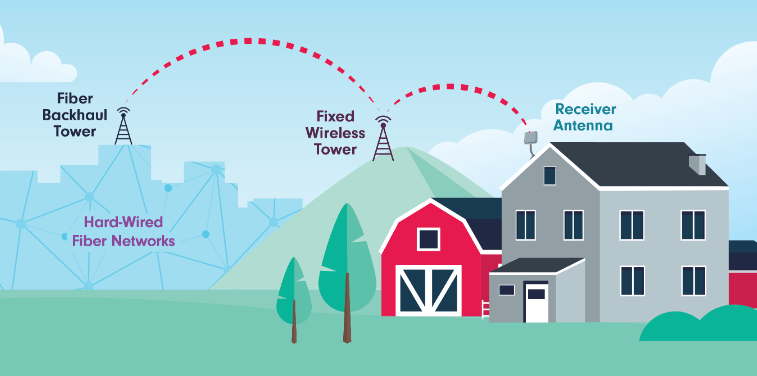
Fixed wireless broadband is a type of wireless communication technology that provides high-speed internet connectivity to fixed locations using radio waves. It is different from mobile wireless broadband, which provides internet connectivity to mobile devices, such as smartphones and tablets, using cellular networks. Fixed wireless broadband is typically used in areas where traditional wired internet infrastructure, such as fibre-optic cables are not feasible or cost-effective.
How does Fixed Wireless Broadband Work?
Fixed wireless broadband works by transmitting data between two fixed points using radio waves. It typically consists of four main components: the subscriber unit, antenna, access point, and backhaul link.
The subscriber unit is a device that is installed on the customer’s premises to receive the wireless signal. The Rural Wireless broadband dish connect to the customer’s router receiving data directly from the local wireless tower.
The access point is a device that transmits the wireless signal to the subscriber unit. It is typically located on a tower or a tall building and is connected to the internet via a fibre or high-speed wireless connection.
The backhaul is a wired connection that connects the access point to the internet backbone. It can be a fibre-optic cable or a microwave link.
Advantages of Fixed Wireless Broadband
Fixed wireless broadband offers several advantages over traditional wired internet infrastructure, including:
Faster Deployment
Fixed wireless broadband can be deployed much faster than traditional wired internet infrastructure, which requires extensive planning and construction. Fixed wireless broadband can be set up in a matter of days, making it an ideal solution for areas where there is an urgent need for internet connectivity.
Cost-Effective
Fixed wireless broadband is typically more cost-effective than traditional wired internet infrastructure, which requires expensive equipment and labour to install. Fixed wireless broadband can be set up at a fraction of the cost, making it an attractive option for rural areas and other underserved communities.
Flexibility
Fixed wireless broadband can be easily scaled up or down depending on the needs of the community. If more bandwidth is needed, additional access points can be added to the network, providing more capacity to support more subscribers.
Limitations of Fixed Wireless Broadband
Fixed wireless broadband also has some limitations that should be taken into consideration, including:
Line-of-Sight (LOS) Requirement
Fixed wireless broadband requires a clear line of sight between the antenna and the access point. Obstructions such as trees, buildings, and hills can interfere with the signal, reducing the quality of the connection. This can be a challenge in areas with rugged terrain or dense foliage.
Interference
Fixed wireless broadband can be affected by interference from other wireless devices such as microwaves, cordless phones, and Bluetooth devices. This can cause signal degradation and reduce the quality of the connection.
Comparison with Other Internet Technologies
Fixed wireless broadband offers several advantages over other internet technologies, including:
-
- More cost-effective than traditional wired internet infrastructure.
- Faster to deploy than traditional wired internet infrastructure.
- More scalable than traditional wired internet infrastructure.
- Can be an ideal solution for areas where wired internet infrastructure is not feasible or cost-effective.
However, fixed wireless broadband has some limitations compared to other internet technologies, such as:
-
- Limited bandwidth compared to fiber-optic cables.
- Higher latency compared to fiber-optic cables.
- Requires a clear line-of-sight between the antenna and the access point.
Conclusion
Fixed wireless broadband is a reliable and cost-effective alternative to traditional fibre internet infrastructure in areas where it is not feasible or cost-effective. By using radio waves to transmit data between fixed points, fixed wireless broadband can provide high-speed internet connectivity to homes and businesses in rural areas and other underserved communities. While it has some limitations, fixed wireless broadband offers many advantages over other internet technologies and is an excellent solution for bridging the digital divide.
FAQs
-
- Is fixed wireless broadband as fast as fibre internet?
-
- Fixed wireless broadband can provide high-speed internet connectivity, but it may not be as fast as wired internet, such as fiber-optic cables.
- How does fixed wireless broadband compare to satellite internet?
- Fixed wireless broadband typically offers lower latency compared to satellite internet, which can make it a better option for applications that require real-time communication, such as online gaming or video conferencing.
- Can fixed wireless broadband be affected by weather conditions?
- Yes, fixed wireless broadband can be affected by weather conditions such as heavy rain, snow, or fog, which can interfere with the signal and reduce the quality of the connection in extreme conditions but over all it is very reliable.
- Can fixed wireless broadband be used in urban areas?
- Yes, fixed wireless broadband can be used in urban areas, but it may be more challenging to deploy due to the higher density of buildings and other obstacles that can interfere with the signal.
- Is fixed wireless broadband a secure way to access the internet?
- Yes, fixed wireless broadband can be a secure way to access the internet if proper security measures are implemented, such as encryption and authentication protocols. All Rural Wireless connections from the server to the customer premises are very secure.
